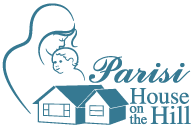Parisi House Provides a Safe Place
 For many women who come to Parisi House, it starts with a call to Child Protective Services (CPS). The call might be from hospital staff after a baby is born with drugs in their system, or some other person concerned about the welfare of a child. Often these moms make the choice to go to Dependency Wellness Court (DWC), where they get the opportunity to enter our program.
For many women who come to Parisi House, it starts with a call to Child Protective Services (CPS). The call might be from hospital staff after a baby is born with drugs in their system, or some other person concerned about the welfare of a child. Often these moms make the choice to go to Dependency Wellness Court (DWC), where they get the opportunity to enter our program.
DWC is part of the Juvenile Dependency Court, which determines whether parents will lose custody of their children. Its function is to help parents get the support they need to break free from addiction and provide a good home to their kids so they can be reunited with them.
Cases in DWC run parallel to the legal case in Juvenile Dependency Court. Parents receive the support of a team of professionals – including social workers, trauma specialists, child advocates, eligibility workers, lawyers and mental health liaisons.
“We work with that team,” explains Jeff Geiger, Program Director at Parisi House. “A social worker will send a referral to our program through the courts. Once we have all the details, we follow up with the client and arrange a time for her to be admitted into the program.”
Parisi House also provides transportation so moms can make their court dates and access services they need. During the pandemic, when court sessions were held remotely, staff made sure moms had a private room where they could attend their appointments through Zoom.
Many of the women who end up in DWC often face a number of interconnecting issues, including domestic violence, homelessness and mental health issues, which can make recovery even more difficult. Parisi House addresses those multidimensional aspects of addiction while providing a safe environment.
Parisi House Provides a Safe Place

For many women who come to Parisi House, it starts with a call to Child Protective Services (CPS). The call might be from hospital staff after a baby is born with drugs in their system, or some other person concerned about the welfare of a child. Often these moms make the choice to go to Dependency Wellness Court (DWC), where they get the opportunity to enter our program.
DWC is part of the Juvenile Dependency Court, which determines whether parents will lose custody of their children. Its function is to help parents get the support they need to break free from addiction and provide a good home to their kids so they can be reunited with them.
Cases in DWC run parallel to the legal case in Juvenile Dependency Court. Parents receive the support of a team of professionals – including social workers, trauma specialists, child advocates, eligibility workers, lawyers and mental health liaisons.
“We work with that team,” explains Jeff Geiger, Program Director at Parisi House. “A social worker will send a referral to our program through the courts. Once we have all the details, we follow up with the client and arrange a time for her to be admitted into the program.”
Parisi House also provides transportation so moms can make their court dates and access services they need. During the pandemic, when court sessions were held remotely, staff made sure moms had a private room where they could attend their appointments through Zoom.
Many of the women who end up in DWC often face a number of interconnecting issues, including domestic violence, homelessness and mental health issues, which can make recovery even more difficult. Parisi House addresses those multidimensional aspects of addiction while providing a safe environment.

